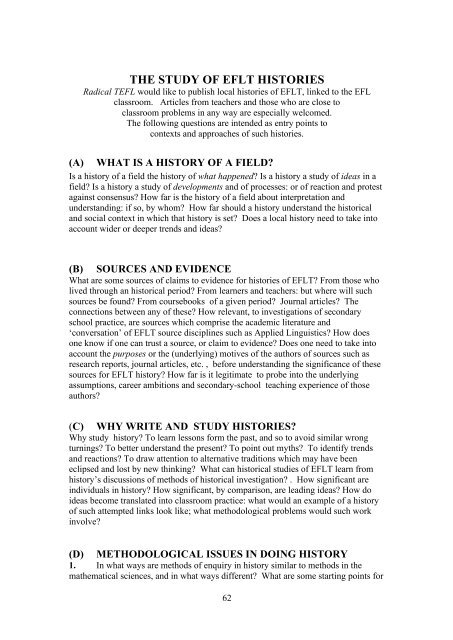RADICAL TEFL
2hqhXJd
2hqhXJd
You also want an ePaper? Increase the reach of your titles
YUMPU automatically turns print PDFs into web optimized ePapers that Google loves.
THE STUDY OF EFLT HISTORIES<br />
Radical <strong>TEFL</strong> would like to publish local histories of EFLT, linked to the EFL<br />
classroom. Articles from teachers and those who are close to<br />
classroom problems in any way are especially welcomed.<br />
The following questions are intended as entry points to<br />
contexts and approaches of such histories.<br />
(A) WHAT IS A HISTORY OF A FIELD?<br />
Is a history of a field the history of what happened? Is a history a study of ideas in a<br />
field? Is a history a study of developments and of processes: or of reaction and protest<br />
against consensus? How far is the history of a field about interpretation and<br />
understanding: if so, by whom? How far should a history understand the historical<br />
and social context in which that history is set? Does a local history need to take into<br />
account wider or deeper trends and ideas?<br />
(B) SOURCES AND EVIDENCE<br />
What are some sources of claims to evidence for histories of EFLT? From those who<br />
lived through an historical period? From learners and teachers: but where will such<br />
sources be found? From coursebooks of a given period? Journal articles? The<br />
connections between any of these? How relevant, to investigations of secondary<br />
school practice, are sources which comprise the academic literature and<br />
‘conversation’ of EFLT source disciplines such as Applied Linguistics? How does<br />
one know if one can trust a source, or claim to evidence? Does one need to take into<br />
account the purposes or the (underlying) motives of the authors of sources such as<br />
research reports, journal articles, etc. , before understanding the significance of these<br />
sources for EFLT history? How far is it legitimate to probe into the underlying<br />
assumptions, career ambitions and secondary-school teaching experience of those<br />
authors?<br />
(C) WHY WRITE AND STUDY HISTORIES?<br />
Why study history? To learn lessons form the past, and so to avoid similar wrong<br />
turnings? To better understand the present? To point out myths? To identify trends<br />
and reactions? To draw attention to alternative traditions which may have been<br />
eclipsed and lost by new thinking? What can historical studies of EFLT learn from<br />
history’s discussions of methods of historical investigation? . How significant are<br />
individuals in history? How significant, by comparison, are leading ideas? How do<br />
ideas become translated into classroom practice: what would an example of a history<br />
of such attempted links look like; what methodological problems would such work<br />
involve?<br />
(D) METHODOLOGICAL ISSUES IN DOING HISTORY<br />
1. In what ways are methods of enquiry in history similar to methods in the<br />
mathematical sciences, and in what ways different? What are some starting points for<br />
62


